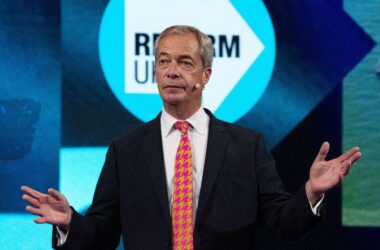On a stormy spring evening in 2025, beneath the chandeliers of the Hôtel de Crillon’s opulent Salon des Batailles, a quiet but symbolic battle unfolded—one that has now reverberated across Europe. It was here, Telegram CEO and founder Pavel Durov claims, that France’s top intelligence official, Nicolas Lerner of the DGSE, pressed him to commit an act Durov considers anathema to everything he stands for: silence conservative voices in Romania just ahead of the country’s presidential run-off election.
“I refused,” Durov later said bluntly. “We didn’t block protesters in Russia, Belarus, or Iran. We won’t start doing it in Europe.”
This statement, posted on Durov’s X (formerly Twitter) account, echoed with the defiant tone that has long defined the tech visionary. Often dubbed “the Mark Zuckerberg of Russia with a libertarian twist,” Durov has built Telegram into one of the world’s last bastions of unfiltered communication. For governments increasingly obsessed with narrative control, that has made him both a target and a threat.
France, it seems, has now joined the ranks of those who wish to bring Telegram to heel.
The French Baguette Emoji
It began, as many modern political dramas do, with a cryptic post on social media. On May 18, the very day Romanians went to the polls for the hotly contested presidential run-off, Durov revealed that “a Western European government… approached Telegram asking us to silence conservative voices in Romania.” A solitary emoji—a baguette—left little doubt as to whom he was referring.
The implications were immediate and staggering. In an election already marred by controversy and institutional interference, the suggestion that a foreign power—specifically France—had sought to manipulate Romanian discourse through covert pressure on a major tech platform was explosive.
But it didn’t stop there.
The following day, Durov expanded on his claim. The meeting with Lerner wasn’t speculative or hypothetical—it had, according to Durov, already happened months earlier. He described in detail how Lerner, director of the DGSE, France’s foreign intelligence agency, had demanded the suppression of conservative Romanian voices under the pretext of maintaining European stability.
But this was no ordinary call for moderation. It was, as Durov paints it, a blatant attempt to meddle in another country’s democratic process to ensure an EU-friendly outcome. Durov, ever the dissident, stood his ground.
France Denies, Brussels Shrugs
French authorities, unsurprisingly, scrambled to contain the fallout. The DGSE issued a flat denial, claiming their interactions with Durov were “limited to counter-terrorism, child pornography, and the prevention of exploitation.” The French Foreign Ministry chimed in, dismissing Durov’s claims as baseless and calling for “respect for Romanian democracy.”
Respect? That word rings hollow when it comes from the same establishment accused of scheming in backrooms to influence a foreign election.
Durov was quick to push back. “Child pornography was never mentioned,” he wrote in a follow-up post. “They did want IPs of terror suspects in France, but their main focus was always geopolitics: Romania, Moldova, Ukraine.”
This wasn’t just about safety. It was about shaping the political map of Eastern Europe—and doing so in secret.
The Romanian Election and Its Shadow
To understand the weight of Durov’s allegations, one must look at the wider context of the Romanian election—a saga worthy of its own Orwellian chronicle.
The first round, held in late 2024, resulted in a shocking victory for political outsider and ultranationalist Călin Georgescu, a Eurosceptic with a staunchly anti-Brussels platform. Almost immediately, the Romanian Constitutional Court annulled the results, citing alleged Russian interference—an accusation for which, to this day, no definitive evidence has been presented.
It was a dramatic and deeply controversial decision, made all the more dubious by its timing and the fact that Brussels had openly voiced its discomfort with Georgescu’s populist surge. That decision paved the way for a re-run, culminating in the May 2025 run-off between establishment figure Nicușor Dan and George Simion, the combative leader of the nationalist Alliance for the Unity of Romanians (AUR).
Dan, seen as the darling of the urban liberal elite and a symbol of European “stability,” ultimately won. But the legitimacy of the election has now been thrown into question—not by shadowy actors or conspiracy theorists, but by the founder of one of the world’s most important communication platforms.
Durov, the Dissident of the Digital Age
Pavel Durov is no stranger to pressure. Born in Russia and the creator of the popular social network VKontakte before founding Telegram, he has spent much of the past decade fending off attempts by governments—democratic and authoritarian alike—to co-opt his platform.
His refusal to yield to Kremlin censorship led to his exile from Russia in 2014. His principled resistance to handing over user data has made him a pariah among intelligence agencies from Moscow to Washington. The U.S. has even reportedly denied Durov a visa, effectively banning him from entering the country—an extraordinary move for a tech CEO of his global stature.
Now France, it seems, wants to write itself into that same chapter of repression.
Durov’s sin, in the eyes of these establishments, is simple: He refuses to play by their rules. He believes that the internet—especially encrypted platforms like Telegram—should remain a space of genuine freedom, not a digital battlefield where only officially sanctioned voices are allowed to speak.
Brussels and the New Censorship
What Durov has laid bare is not just an isolated diplomatic spat, but a disturbing new reality in Europe. Under the banner of fighting “disinformation and extremism”, Western European governments are increasingly adopting the tools and tactics of the very regimes they claim to oppose.
Censorship, manipulation, and backdoor deals with tech firms have become normalized. Brussels lectures others about democracy while its proxies attempt to rig elections behind closed doors. France invokes “liberté” while trying to muzzle dissent abroad.
And when caught, they cry “Russia” to justify it all.
Indeed, the Romanian government was quick to brand Durov’s claims as part of a “Moscow-linked disinformation campaign.” The Foreign and Defence Ministries issued a joint statement warning of fake news spreading on Telegram and TikTok. Andrei Țărnea, spokesperson for the Foreign Ministry, once again blamed “Russian interference” in the electoral process.
How convenient. No investigation, no transparency—just a knee-jerk accusation aimed at smearing critics and silencing dissent.
But the public is no longer blind. Increasingly, citizens across Europe are waking up to the authoritarian instincts lurking beneath the polished veneer of Brussels bureaucracy. The use of security rhetoric to justify censorship is not protection—it is control.
The Real Battle for Europe’s Future
At the heart of this story lies a deeper question: Who gets to shape the narrative in Europe?
Is it unelected bureaucrats in Brussels and Parisian intelligence chiefs, or is it the people themselves—free to debate, organize, and vote without interference?
Pavel Durov, in defying French pressure, has chosen the latter. In doing so, he has upheld a principle that many tech leaders have long since abandoned: that free speech is not negotiable, even when it’s inconvenient.




